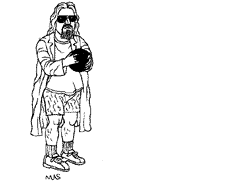
Movies
The Big Lebowski (Gramercy Pictures). Critics are split on the Coen brothers' follow-up to Fargo. The positive spin: They've grafted their trademark deadpan wit onto a '90s film noir. (In the movie, an aging stoner [Jeff Bridges] and his psychotic bowling partner [John Goodman] get caught up in a botched kidnapping scheme.) "Cheech & Chong bumbling about in Philip Marlowe's gumshoes," writes Rita Kempley of the Washington Post. The negative spin: Like other Coen films, this one is clever but rambling and undisciplined. The auteurs "have reached a stage where they no longer question their ideas or flesh them out" (Alex Ross, Slate). (Click here for the official site.)
Primary Colors (Universal Pictures) hype. Buzz builds for the March 20 opening of Mike Nichols' adaptation of Joe Klein's roman à clef about the 1992 presidential campaign. Cover articles about the film appear in Time, New York, and George. Political predictions ensue: Either John Travolta's portrayal of Gov. Jack Stanton, a Clinton-like philanderer, will hurt the president, or it will help him. The character is "a mixed bag, a stinker who does some good," says Richard Lacayo in Time. Most-repeated rumor: Travolta, a Scientologist, promised to make Stanton sympathetic if Clinton pressed Germany to stop harassing his co-religionists. (Click here for a trailer.)
Twilight (Paramount Pictures). Critics agree that 73-year-old Paul Newman only improves with age. He's "the last of Hollywood's sex-god aristocrats" (Owen Gleiberman, Entertainment Weekly). The praise is less fulsome for Twilight, in which Newman plays a retired detective who is talked into investigating a murder even though his lover (Susan Sarandon) is implicated . The self-conscious cracks about aging and the stylish shots of Los Angeles are said to be entertaining, but the movie's pace is deemed sluggish. Its plot, says The New Yorker's Anthony Lane, "would just about grace an average episode of TheRockford Files." (A trailer is available here.)
U.S. Marshals (Warner Bros.). This unofficial sequel to the 1993 thriller The Fugitive is judged inferior to its predecessor. Critics feel Wesley Snipes lacks the gravitas to replace Harrison Ford as a falsely accused man on the lam, though some claim that Tommy Lee Jones, as the U.S. marshal who chases him, saves the film. The Los Angeles Times' John Anderson says you might enjoy the movie's "escapist thrills" but predicts "you'll feel cheap in the morning." (The studio touts the movie here.)
Theater
The Beauty Queen of Leenane (Atlantic Theatre Co., New York City). Excitement greets the U.S. debut of 27-year-old Anglo-Irish sensation Martin McDonagh. He is "[d]estined to be one of the theatrical luminaries of the 21st century," says the New Republic's Robert Brustein. Reviewers declare his play about a 40-year-old virgin and her mother "more immediate and vital than any new drama in seasons" (Ben Brantley, the New York Times). Dissenters call McDonagh a "sadistic manipulative writer with an unappealing ruthlessness toward his characters" (Charles Spencer, the London Daily Telegraph).

Books
One Nation, After All, by Alan Wolfe (Viking Press). Sociologist Alan Wolfe examines "what middle-class Americans really think." Critics are pleasantly surprised by Wolfe's unconventional conclusion, based on in-depth interviews with 200 middle-class Americans, that mainstream America is tolerant, pragmatic, and basically liberal (except when it comes to gays). "If you are a sucker for Walt Whitman ... and the belief that Americans are basically a good and just people--some of this stuff will make you weep" (Brent Staples, the New York Times Book Review). Osha Gray Davidson, dissenting in the Los Angeles Times Book Review, accuses Wolfe of romanticizing the middle class: "a wet kiss masquerading as social science." (Click here for Jonathan Rieder's review in Slate and here for an excerpt from the book.)
A History of the American People, by Paul Johnson (HarperCollins). The conservative British journalist, known for his mammoth histories, writes an old-fashioned "Great Man" chronicle of the United States. Reviews praise Johnson's range and lively prose but chide him for ignoring 30 years of scholarship and slighting America's racial and economic iniquities. "The most malignly error-ridden study of the American people to appear since the Politburo went out of business" (Robert Sam Anson, the London Times). Even Newt Gingrich, who raves about the book in the Weekly Standard, says Johnson's account of events since the 1960s is too polemical.
Recent "Summary Judgment" columns
Movie--An Alan Smithee Film: Burn Hollywood Burn;
Movie--Krippendorf's Tribe;
Movie--Lolita;
Music--Ray of Light, by Madonna;
Book--The Smithsonian Institution, by Gore Vidal;
Theater--Art;
Art--"Chuck Close."
Television--The American Experience: Reagan (PBS);
Television--The Wedding (ABC);
Television--The Closer (CBS);
Movie--Palmetto;
Book--Cloudsplitter, by Russell Banks;
Art--"Fernand Léger" (Museum of Modern Art);
Theater--Freak.
Movie--Sphere;
Movie--Mrs. Dalloway;
Movie--The Wedding Singer;
Book--The Street Lawyer, by John Grisham;
Book--Riven Rock, by T. Coraghessan Boyle;
Television--18th Winter Olympics (CBS);
Theater--The Vagina Monologues.
Movie--Nil by Mouth;
Movie--Blues Brothers 2000;
OscarNominations, early reviews;
Theater--Shopping and Fucking;
Book--Jack Maggs: A Novel, by Peter Carey;
Book--Black and Blue, by Anna Quindlen;
Music--Yield, by Pearl Jam;
Art--"China: 5,000 Years" (Guggenheim).
--Franklin Foer
